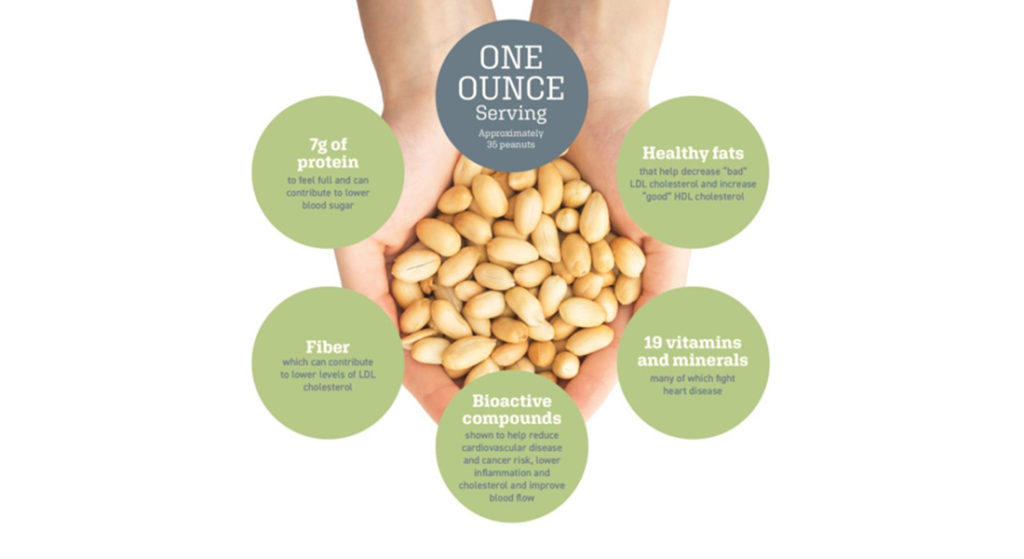A crunchy snack that pairs well with a multitude of food and drinks, and can even be enjoyed on its own, has reached superfood status after being found to help lower the risk of certain diseases. According to The Peanut Institute, multiple studies have found that the consumption of small amounts of peanuts or peanut butter can help to reduce the risk of developing cancer, heart disease and diabetes.
The non-profit organization, which promotes nutrition research and developing healthy lifestyles that include peanuts and peanut products, claims that most of these studies were conducted in the past year alone. While the organization is known to be financially supported by multiple peanut producers, they have provided hard evidence to back up their claims in the form of multiple scientific studies.
“Studies conducted in the United States and around the world reveal that eating peanuts regularly helps prevent disease, improves life expectancy and delivers positive effects throughout the body,” says Dr. Samara Sterling, director of research for The Peanut Institute. “Peanuts qualify as a superfood because they’re nutrient-dense, delivering superior health benefits in a very small serving. When you compare peanuts to kale, it’s a stark difference in terms of the amount you need to consume to reap the food’s benefits. For example, one serving of peanuts contains six times as much protein as a serving of raw kale and eight times as much niacin.”
According to Sterling, the recommended daily serving is one ounce of peanuts, which is equivalent to approximately a handful of nuts, or two tablespoons of peanut butter. This single ounce serving has seven grams of protein and 19 vitamins and minerals, many of which are associated with preventing heart disease. In addition, a single ounce serving of peanuts contains bioactive compounds such as polyphenols, phytosterols and antioxidants, which have been shown to help lower the risk of cardiovascular disease and cancer, reduce inflammation and cholesterol and improve blood flow. Peanuts are also a great source of fiber and healthy fats such as monounsaturated and polyunsaturated fats. According to Sterling, all of these nutritional components work together to reduce the risk of chronic disease.
The Peanut Institute also cited multiple studies that have found that peanuts can help to reduce the risk of cancer, heart disease, diabetes and even Alzheimer’s. A Netherlands Cohort study which was published in 2018 found that eating peanuts daily can decrease the risk of breast cancer in postmenopausal women; a similar Netherlands study found that men who consume a teaspoon of peanut butter a day reduced their risk of pancreatic cancer.
Another 2018 study published in the Current Atherosclerosis Reports found that the regular consumption of peanuts can reduce the risk of cardiovascular disease. In fact, a 2017 study which involved over 200,000 participants found that regular peanut consumption decreased the risk of coronary heart disease by 15 percent.
Harvard University also conducted a study on the effects of peanuts on human health. The 2016 study found that substituting a serving of animal protein with plant-based protein such as peanuts or peanut butter can significantly reduce the risk of developing type 2 diabetes. In addition, a landmark study which was published in the Journal of the American Medical Association found the peanut consumption reduced the risk of type 2 diabetes in women by 21 percent.
Peanuts have also been found to help reduce age-related cognitive decline, which is commonly associated with Alzheimer’s disease. This is because peanuts contain high levels of niacin which has been found to slow down the rate of cognitive decline in people 65 years or older. Peanuts have also been found to be a good source of vitamin E which could delay the functional decline in patients with Alzheimer’s disease, according to a study cited by The Peanut Institute.
Additionally, the highly nutritious nut is the primary ingredient in a form of ready-to-use therapeutic foods. The product is a peanut paste that also contains skim milk powder, vitamins and minerals. This nutrient-dense paste has been used to treat malnutrition in children around the world since 2005 and is able to help malnourished children recover within weeks.
Considering these factors, there is no denying the fact that peanuts are a highly-nutritious type of food. This is why the nut might be successful in becoming the next big superfood trend.
Food companies are always on the lookout for the next superfood because consumers tend to appreciate food products that deliver multiple health benefits. Recently, food giant Nestlé announced their interest goldenberries because they believe that the fruit has superfood potential. Additionally, the VTT Technical Research Centre of Finland found a way to produce nutrient-dense superfoods in their laboratory because the superfood trend is expected to continue to grow in the food industry. According to ResearchAndMarkets, the global superfood market is expected to grow at a CAGR of 15.7 percent between 2018 and 2022.
This trend might be due to the fact that consumers are starting to look at food as a type of medicine. In fact, the global health and wellness food market was valued at $707.12 billion in 2016 and is expected to increase to $811.82 trillion by 2021. This significant jump in market value really speaks towards the current demand for functional and nutrient-dense food options.
“It was Hippocrates, the father of medicine, who famously said, ‘Let food be thy medicine and medicine thy food.’ I am excited that as a society we are in a place where we are realizing that eating a tasty snack like peanuts is not just a way to stop hunger pangs; this superfood can deliver powerful benefits to our bodies that help to maintain and restore health,” says Dr. Sterling.












Join or login to leave a comment
JOIN LOGIN